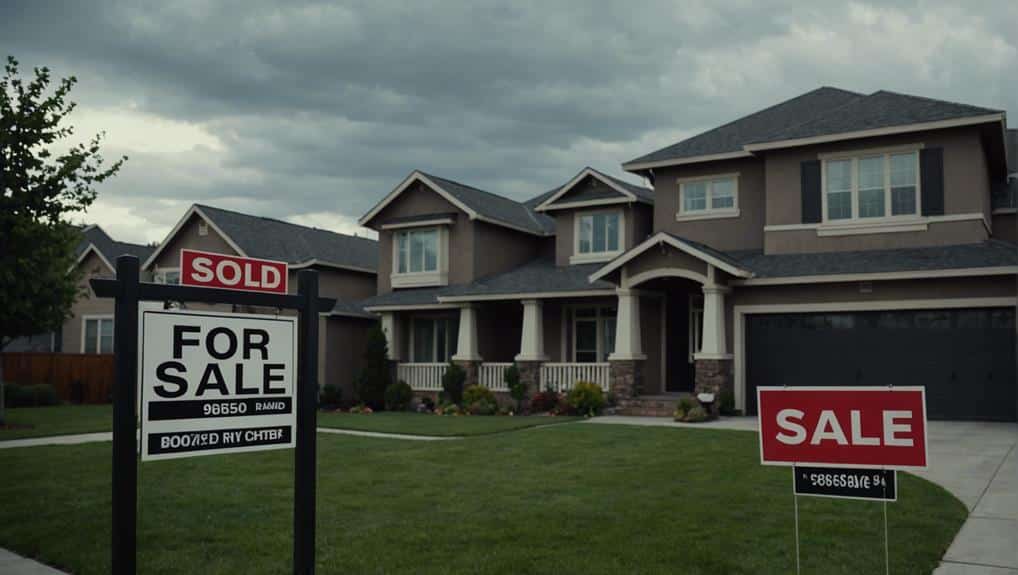Avoid overpricing your home as it can hinder its sale, making it linger on the market and deterring potential buyers, which may lead to price reductions. Proper market analysis and understanding pricing trends are crucial to setting a competitive price reflecting actual market value. Engage with professional estate agents for their expertise and use flexible pricing strategies based on market feedback to prevent overpricing pitfalls.
Aligning the price with market expectations increases the likelihood of a prompt and profitable sale. Learn valuable insights to improve your selling strategy and avoid overpricing issues that can prolong the selling process and diminish buyer interest.
Key Takeaways
- Homes priced too high can stay on the market longer, leading to negative perceptions among potential buyers.
- Overpricing may deter offers, as buyers are sensitive to perceived value versus market reality.
- Continuous market analysis is crucial, as ignoring comparative sales data can result in incorrect pricing.
- Overpriced properties often require subsequent price reductions, potentially selling for less than if priced correctly initially.
- Engaging a real estate expert can provide crucial insights and strategies to align the home’s price with current market conditions.
Avoid Overpricing: Identifying The Signs
Several indicators can reveal if a home is overpriced, especially if it remains on the market for an extended period without receiving any offers. In the dynamic real estate landscape, understanding these signs is vital for sellers aiming to navigate the housing market successfully. A key indicator of overpricing is when a property fails to attract offers despite being actively shown. This scenario often suggests that potential buyers do not perceive the asking price as aligned with the property’s value.
Additionally, a significant decrease in foot traffic during open houses or scheduled showings can indicate overpricing. Initially, a new listing might attract attention, but it might be time to reassess the price if interest wanes quickly without serious offers. The Real Estate market is sensitive, and pricing a home correctly from the start is essential. Overpriced homes risk falling into a cycle of price reductions, ultimately leading to a lower final sale price than if priced correctly at the outset.
Sellers should heed these market signals—prolonged listing periods, lack of offers despite frequent showings, and dwindling visitor numbers—to avoid the pitfalls of overpricing and to foster a more favorable transaction outcome.
Impact of Overpricing
Understanding the indicators of overpricing is instrumental in grasping its broader impact on the duration and success of home sales. When a property is listed at a higher price than its market value, it naturally leads to a prolonged period on the market. This extended time can be detrimental, as potential buyers may question the property’s desirability. The perception that a home has lingered unsold for long can lead buyers to suspect underlying issues, whether or not they exist.
They are overpricing home risks, creating a negative market perception. Aware of their options and market conditions, buyers can perceive an overpriced property as a poor investment, leading them to either bypass it or submit lower offers, anticipating a negotiation due to the inflated price. This scenario often forces sellers to adjust prices, which might convey desperation, further decreasing the property’s appeal and possibly its final selling price.
In essence, strategic pricing aligns a property’s market value with buyer expectations, enhancing its marketability and reducing the likelihood of adverse outcomes. Overpricing, conversely, can jeopardize not just the sale duration but also the overall transaction success.
Setting the Right Price

Setting the appropriate price from the outset is vital to attract serious buyers and expedite the sale of your home. Overpricing can be a detrimental strategy, often resulting in a prolonged market presence that gradually diminishes buyer interest and necessitates price reductions, which might lead to selling at a lower price than initially priced.
Accurate pricing aligns your property with its actual market value and sparks heightened buyer competition. This approach can lead to quicker offers, potentially driving the price closer to or above the asking price due to heightened buyer interest. It’s about finding the sweet spot where the perceived value meets market reality, ensuring your home does not languish unsold due to unrealistic pricing expectations.
Strategic pricing is more than just a number; it’s a signal to the market of serious intent to sell, enhancing credibility and attracting a broader pool of potential buyers. Engaging with a knowledgeable real estate agent can provide invaluable guidance. Their expertise in evaluating competitive market dynamics and understanding buyer psychology can prove essential in setting a price that meets your timelines and financial goals without deterring potential buyers.
The Role of Market Analysis
A thorough market analysis in real estate is essential for aligning a home’s listing price with its actual market value. By understanding comparative market values and recognizing pricing trends, sellers can establish prices that attract buyers and enhance the likelihood of a swift and profitable sale. This strategic approach to pricing, grounded in diligent market research, is vital for effectively maneuvering through the competitive dynamics of the real estate market.
Understanding Comparative Market Values
Analyzing recent sales of comparable properties offers a dependable method for determining the market value of a home. This process, known as comparative market analysis, considers essential factors such as location, size, condition, and amenities to establish a competitive and authentic listing price. By understanding the current value of similar homes in the area, sellers can gauge where their property stands in the market.
This is essential for avoiding the pitfalls of overpricing, which can deter potential buyers and prolong the selling process. An accurate market analysis is not merely beneficial—it is imperative for sellers aiming to make informed, strategic decisions about pricing their property effectively in a fluctuating real estate market.
Importance of Pricing Trends
Building on the foundation of comparative market analysis, understanding pricing trends is indispensable for aligning a home’s asking price with current market demands. Market analysis is critical as it helps determine a property’s value by considering recent sales and ongoing market trends. This understanding aids sellers in setting a price that not only attracts potential buyers but also remains competitive.
Sellers can pinpoint a strategic, competitive price point by analyzing comparable properties. Additionally, continuous monitoring of market fluctuations through diligent analysis allows sellers to make informed decisions, adjusting pricing strategies to enhance the property’s appeal and optimize selling potential. This approach guarantees that the pricing aligns with what buyers are prepared to pay, improving the likelihood of a successful sale.
Pricing Strategies to Consider

To effectively navigate the complexities of the property market, sellers should carefully contemplate various pricing strategies that can optimize their chances of a successful home sale. Establishing the right price from the onset is pivotal, but so is maintaining the flexibility to adapt as market conditions evolve. By strategically setting and adjusting the price, you can attract the right buyers and expedite the sale process.
Here are key pricing strategies to ponder:
- Evaluate Market Competition: Understanding how your property compares to others in the area can guide your initial pricing. Setting a competitive price that reflects the current market value can favorably position your home.
- Flexibility in Pricing: Be prepared to adjust your pricing strategy based on real-time market feedback and changes in buyer demand. This agility can prevent stagnation in a dynamic market.
- Seek Professional Advice: Leverage the insights of experienced real estate professionals who understand market trends and can provide valuable guidance on pricing strategies.
- Monitor Buyer Feedback: Actively seek and analyze feedback from potential buyers during showings and open houses. Their perceptions can offer critical insights into how the property is valued in consumers’ eyes, guiding necessary price adjustments.
Implementing these strategies will help align your pricing with market expectations and buyer preferences, enhancing the likelihood of a successful sale.
When to Adjust Your Price
Deciding the optimal moment to adjust your home’s price can significantly enhance its appeal and shorten the time it spends on the market. A critical strategy is to monitor the number of showings and offers your property receives. A decline in these numbers typically signals a need for price adjustment. Property markets are dynamic; what was an attractive price at listing might not hold its appeal after several weeks. If your home has been on the market without receiving any offers, this is a strong indication that potential buyers might find it overpriced.
Furthermore, sustained overpricing can decrease offer value over time, as buyers may perceive the home as less desirable or assume underlying issues due to the lack of interest. This scenario underscores the importance of being responsive to market feedback. Adjusting the price proactively can reinvigorate buyer interest and lead to a quicker sale.
Lastly, consulting with property professionals provides valuable insights into the timing and scale of price adjustments. They can offer data-driven advice tailored to market trends, ensuring your pricing strategy aligns with current buyer expectations and maximizes your property’s marketability.
Feedback From Potential Buyers

Understanding potential buyers’ concerns and comments is essential in the property market. Feedback often highlights specific buyer apprehensions and everyday observations made during viewings, providing sellers with actionable insights to adjust their strategies. By addressing these concerns, sellers can enhance their property’s marketability and align more closely with buyer expectations, potentially speeding up the sale process.
Buyer Concerns Highlighted
Feedback from potential buyers consistently highlights concerns that an overpriced home may complicate their financing options and signal a lack of seller motivation. Such perceptions can significantly deter buyers from considering or making offers on a property, as the risks associated often outweigh the potential benefits. Here are the key issues driving these concerns:
- Appraisal Challenges: Fears that the home will not appraise at the inflated price, leading to loan disapproval.
- Financial Strain: Concerns about overextending finances in a deal not aligned with market realities.
- Doubts About Value: Uncertainty about the home’s worth compared to similar properties.
- Seller Negotiability: Assumptions that a high price tag means the seller may be inflexible in negotiations.
Common Viewing Comments
Common viewing comments often reveal that potential buyers perceive the home as overpriced, especially compared to similar listings in the area. Such feedback frequently centers on the house’s value proposition, underscoring a significant discrepancy between the home’s features and the asking price. This misalignment can deter potential buyers who are wary of investing in a property that does not seem to justify its premium pricing.
Additionally, these observations suggest that the home does not meet market expectations on price points, which can lead to prolonged listing periods and decreased buyer interest. Addressing these pricing concerns promptly could enhance the property’s attractiveness and encourage more favorable buyer engagement.
Consulting With Real Estate Experts
Engaging with property professionals is vital for sellers to gain insights into effective pricing strategies and current market dynamics. Real estate experts can provide an invaluable perspective that helps understand how to price a home correctly. By consulting with these professionals, sellers can avoid the common pitfalls of overpricing, which often leads to prolonged market presence and potential property devaluation.
Real estate experts bring a wealth of benefits:
- Expert Insights on Market Trends: They analyze current market data to advise on the most effective pricing.
- Data-Driven Pricing Strategies: Agents use detailed market analysis to set competitive pricing that attracts buyers.
- Understanding Buyer Psychology: Professionals can guide sellers on what makes a price appealing or off-putting.
- Avoiding Overpricing Pitfalls: Experts help understand the negative impacts of overpricing and adjust the price accordingly.
Frequently Asked Questions
Why Overpricing Your Home Is Bad?
Overpricing your home can deter potential buyers, elongate your market presence, and necessitate price reductions. This ultimately devalues the property and makes it less attractive compared to more competitively priced options in the market.
Why Do Sellers Overprice Their Homes?
Sellers often overprice their homes due to personal attachments, misjudging market conditions, aiming to recover renovation investments, influence from property agents, and the fear of undervaluing their property in a fluctuating market.
What Happens When You OverPrice Your House?
Overpricing a house typically increases market time, decreases buyer interest, and necessitates eventual price reductions. This strategy risks attracting fewer offers and potentially undervaluing the property in the long-term market.
Why Is No One Viewing My House?
Could a lack of viewings signal a deeper issue? Limited buyer interest often stems from homes being priced above market value, deterring potential buyers and prolonging the selling process unnecessarily. Consider reassessing your price.
Essential Points to RememberConclusion
Selling a home can be complex, and pricing the property correctly is critical. Many sellers make common pricing mistakes that can negatively impact their financial performance and lead to a loss of customers. To avoid these costly mistakes, working with an experienced real estate agent with marketing expertise is essential to develop a comprehensive marketing strategy that appeals to the target audience. This strategy should consider the current market conditions, the competition, and the seller’s circumstances to determine the best sale price.
Once the property is listed, paying attention to market feedback and adjusting the pricing strategy accordingly is essential. An informed decision is critical since rash choices can negatively impact selling. A level head and the power of analytics can be vital tools in making sound decisions that lead to a smoother sale and a better return on investment. Additionally, investing in curb appeal, repairs, and virtual tours can be beneficial in attracting prospective buyers and closing deals.
Closing costs, repairs, and overhead costs can all add up, so it’s important to budget appropriately and consider cost optimization strategies. Aggressive cost reductions and everyday cost decisions can benefit the seller’s profit margins and financial goals. However, avoiding sellers’ most significant mistake is critical: underestimating labor, materials, and production costs. An experienced realtor can help the seller navigate this complex process and avoid common contract mistakes that could confuse customers and lost deals.
In summary, the secret to success in the real estate market is to avoid common pricing mistakes and work with an experienced realtor who can provide valuable lessons and a roadmap to success. Sellers can benefit from attractive returns and growth opportunities by developing a comprehensive marketing strategy, paying attention to market feedback, and making informed financial decisions.







